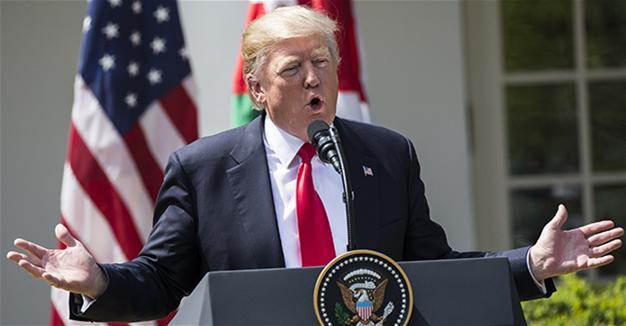Trump says chemical attack in Syria went ‘beyond a red line’
WASHINGTON

U.S. President Donald Trump on April 5 accused Syrian President Bashar al-Assad’s government of going “beyond a red line” with a poison gas attack on civilians, but he declined to spell out how or whether his administration would respond.
In his first extensive remarks on the issue, Trump acknowledged at a joint news conference with Jordan’s King Abdullah that he now had responsibility for Syria policy and said his views of al-Assad had changed.
“It crossed a lot of lines for me,” Trump said of the attack, which he described as an affront to humanity. “That crosses many, many lines, beyond a red line,” he said.
Western countries, including the United States, have blamed Assad’s armed forces for the worst chemical attack in Syria for more than four years. The attack killed at least 86 people, many of them children. The Syrian military has denied responsibility.
Trump did not mention Russia, which asserted on April 5 that Syrian rebels were to blame for the gas attack, a charge U.S. officials dismissed. Russia has been a military backer of al-Assad in the country’s six-year-old civil war.
Trump, a Republican, has criticized his predecessor, Barack Obama, for not following through on his threat to intervene if chemical weapons were used in Syria, but he encouraged the Democratic president at the time not to take action in the war-ravaged country.
Trump said on April 5 that Obama had squandered “a great opportunity” to solve the crisis by failing to uphold his “red line.”
“I think that set us back a long ways, not only in Syria but in many other parts of the world, because it was a blank threat,” Trump said. “It is now my responsibility. It was a great opportunity missed.”
Asked during an earlier Oval Office meeting with Abdullah if he was formulating a new policy toward Syria, Trump told reporters: “You’ll see.”
His comments came just a few days after U.S. statements suggesting a focus on stopping the Islamic State of Iraq and the Levant (ISIL) militants rather than ousting al-Assad.
 U.S. President Donald Trump on April 5 accused Syrian President Bashar al-Assad’s government of going “beyond a red line” with a poison gas attack on civilians, but he declined to spell out how or whether his administration would respond.
U.S. President Donald Trump on April 5 accused Syrian President Bashar al-Assad’s government of going “beyond a red line” with a poison gas attack on civilians, but he declined to spell out how or whether his administration would respond.